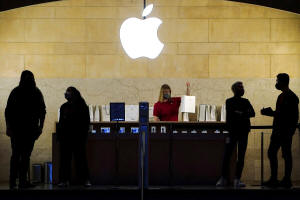|
Apple will hold its annual shareholder meeting on March 4.
Apple and independent third-parties audited the company's global
suppliers in 2020 and found no evidence of forced labor, its
latest proxy filing said. Apple also releases reports with
information on the protection of its supply-chain workers.
But independent human rights investigators have reported that
some Apple suppliers have participated in the Chinese
government's forced labor program in the Xinjiang region,
"bringing into question the effectiveness of these policies and
procedures," ISS said in a report to investors issued Tuesday.
A group of shareholders have asked Apple's board to prepare a
report on how the company protects supply-chain workers from
forced labor. The request covers the extent to which Apple has
identified suppliers and sub-suppliers that are a risk for
forced labor, and how many Apple has taken action against.
"The big picture dream is that Apple puts in place a much more
solid set of policies and procedures, eliminating forced labor
from its supply chain and living by its code of conduct which
says it has zero tolerance for forced labor," said Vicky Wyatt,
campaign director for SumOfUs, a group supporting the
shareholder proposal.
The U.S. Securities and Exchange Commission in December declined
an effort by Apple to skip the shareholder proposal. That same
month, American lawmakers passed a bill banning imports from
China's Xinjiang region over forced-labor concerns.
Apple declined to provide more details, but its proxy said the
company rigorously evaluates labor and human rights risks
associated with prospective suppliers before signing them up.
(Reporting by Danielle Kaye; Editing by Richard Chang)
[© 2022 Thomson Reuters. All rights
reserved.]
This material may not be published,
broadcast, rewritten or redistributed.
Thompson Reuters is solely responsible for this content.

|
|





